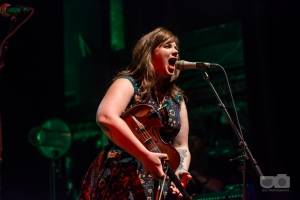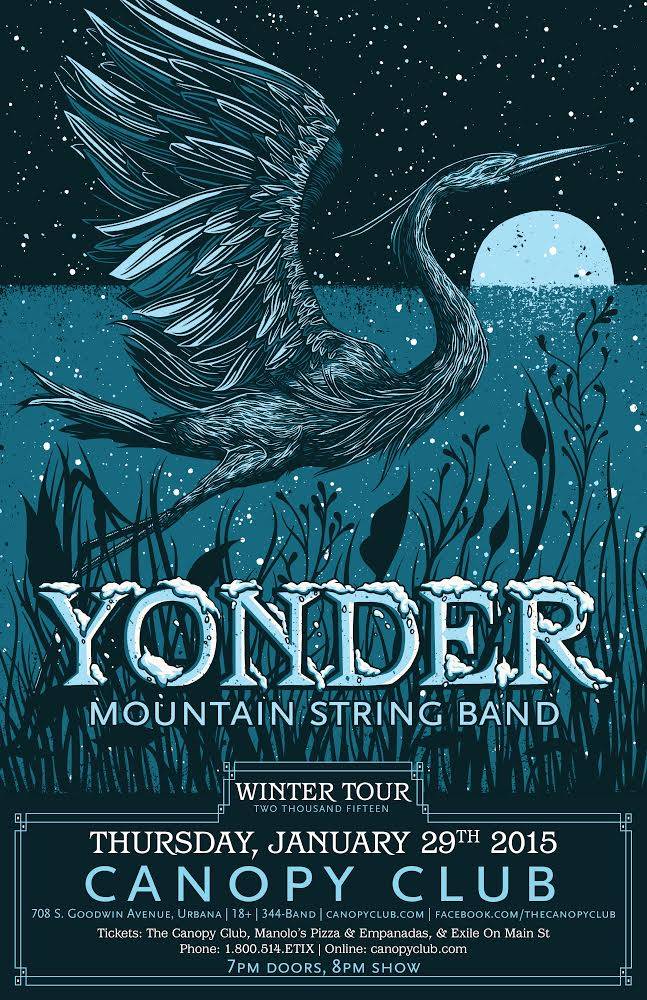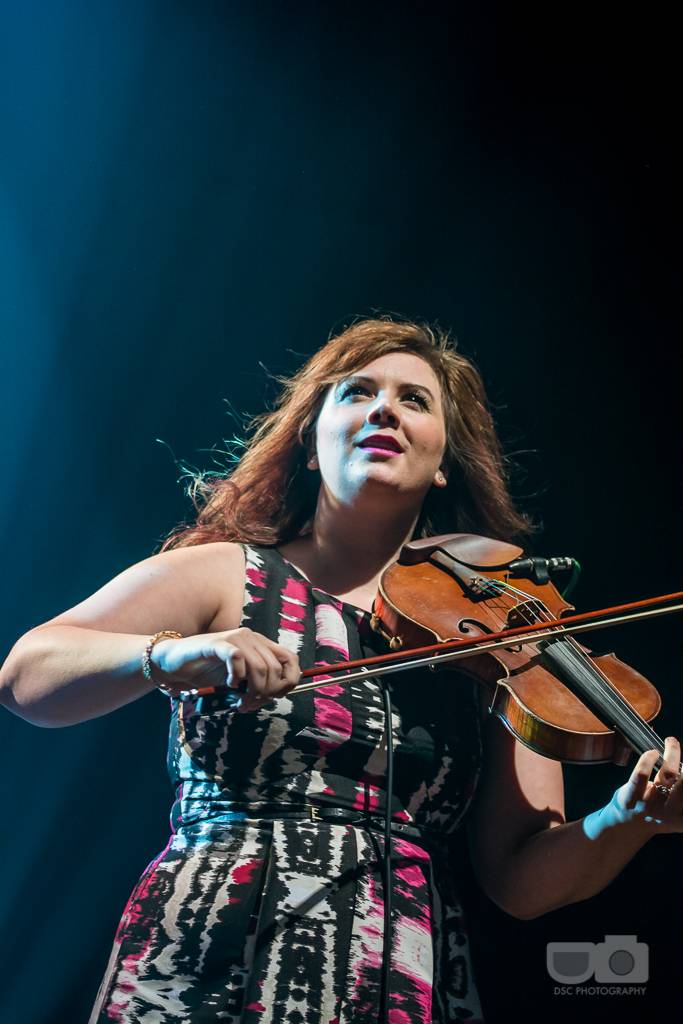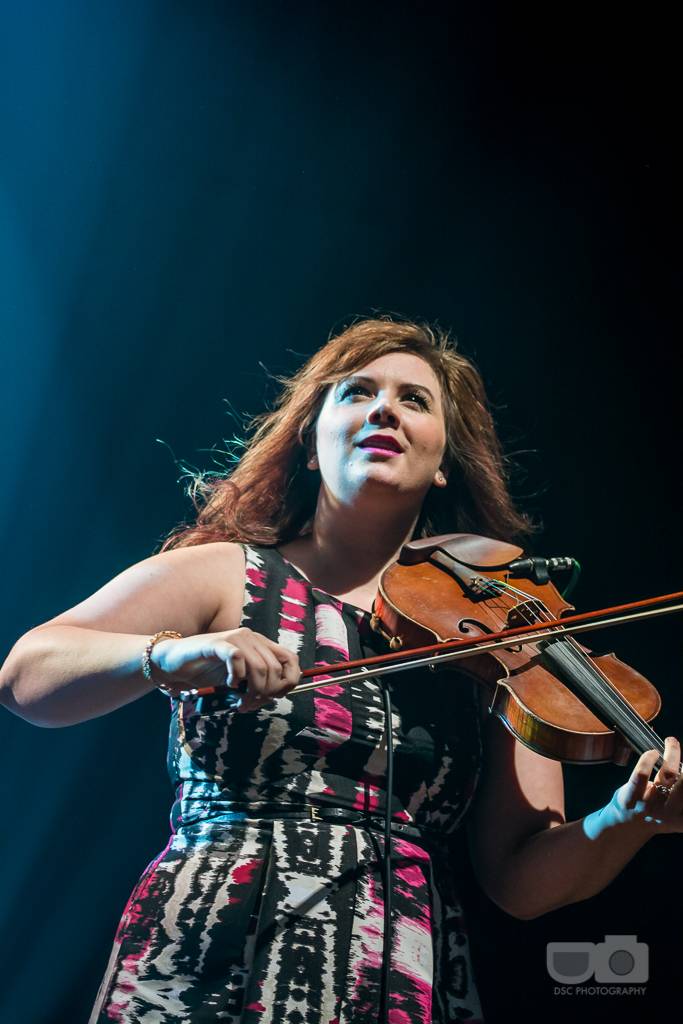 When she attended the University of Illinois, Allie Kral may have been studying classical violin performance, but she credits The Canopy Club for rounding out her musical education. The venue exposed her to an immense array of music, and it was there that she met and eventually joined the bluegrass band Green Mountain Grass. Moving from classical to bluegrass was no easy feat, but the genre’s energy, life, and fun spoke to her in fresh creative ways. After touring with Green Mountain, she went on to join Chicago-based bluegrass band, Cornmeal, where she really honed her bluegrass chops. Last year, she began touring with the Yonder Mountain String Band and remains on board for their current winter tour. The band, with Kral in tow, returns to Urbana on Thursday for a performance at The Canopy Club. For Kral, playing The Canopy Club is akin to coming home, and she took some time from Yonder’s current tour to reminisce and reflect on her musical journey thus far.
When she attended the University of Illinois, Allie Kral may have been studying classical violin performance, but she credits The Canopy Club for rounding out her musical education. The venue exposed her to an immense array of music, and it was there that she met and eventually joined the bluegrass band Green Mountain Grass. Moving from classical to bluegrass was no easy feat, but the genre’s energy, life, and fun spoke to her in fresh creative ways. After touring with Green Mountain, she went on to join Chicago-based bluegrass band, Cornmeal, where she really honed her bluegrass chops. Last year, she began touring with the Yonder Mountain String Band and remains on board for their current winter tour. The band, with Kral in tow, returns to Urbana on Thursday for a performance at The Canopy Club. For Kral, playing The Canopy Club is akin to coming home, and she took some time from Yonder’s current tour to reminisce and reflect on her musical journey thus far.
Smile Politley: Are you excited to be back playing in Urbana?
Allie Kral: I am, especially at The Canopy Club. I just love the Goldberg family, and I love The Canopy Club. When I went to check out the college, I knew already that was where I wanted to go because I was more excited checking out The Canopy Club than I was checking out the campus. I went there and it was a Grateful Dead night or something like that, and I felt so cool because I was away from home, and I was 18, and I was in a bar, listening to music. I probably spent as much time at The Canopy Club as I did in classes.
SP: That would’ve been such a good classroom, though.
Kral: It kind of was my own little classroom, especially when I look back at where I am now. I was learning; I was at class. Thank you. Thank you for justifying me ditching class to go to The Canopy Club.
SP: I feel students will read this and say, “See Mom and Dad, it was all worth it.”
Kral: [Laughs.] I feel bad! I try to be a good influence, you know. I don’t know. I think if you work hard, no matter what path you take, you’ll get somewhere. You’ll get somewhere good.

SP: Has Urbana changed a lot since you were here?
Kral: When I’m there, I’m at the Canopy, which is right where the music buildings are, so I’m bombarded with my old stomping ground. I haven’t taken a walk through Campustown in a long time, so I’m sure it’s changed a lot. There are definitely more restaurants within walking distance to The Canopy Club than when I went to school there.
SP: It’s got to be weird to do a little walk down memory lane and see what you do remember.
Kral: It is. When I first was playing with Cornmeal and coming down to Urbana, I didn’t like it. I was still having mixed emotions about whether it was a good idea that I had [dropped out of the University of Illinois]. I was so scared about my decisions, you know. I’ve since made peace with it and I’m okay about it. I think the journey I’ve taken was the journey I needed to take. It was a little bittersweet at first, but now it’s kickass, it’s so awesome.
SP: Right now you’re doing a lot of bluegrass and folk work. How does it compare to your classical background?
Kral: It was really tough at first! I met some bluegrass musicians at The Canopy Club, and they heard I was into Grateful Dead and Phish and that genre of music, so they were like, “Well you gotta play in our bluegrass band!” And I was like, “I don’t know how to play bluegrass.” They were persistent, so I joined up with them for one practice. I had so much fun trying to play bluegrass, so I kinda started diving into that world. It took me a long time. I don’t think I ever did [Green Mountain Grass] justice when I was with them. I dropped out to tour the country with them, and I had the best time ever and was learning how to play bluegrass, but I think learned more when I joined Cornmeal. I became a little more practical about staying professional, and really, really pursing this as a career.
SP: How did you get linked up with Yonder?
Kral: I met those guys while I was playing with Cornmeal. I looked up to them; they were playing the jam band/bluegrass music scene and doing so well, and wrote the best songs, and had a great following. When I left Cornmeal, I had decided that I wanted to branch out and try a bunch of different genres, because I wanted to become more well rounded. I did that for about a year, and during that year I got a call from Yonder to come play some shows. It started out like, “Hey, do you want to come do this run with us?” I didn’t know if they’d want me for the next one or not, but I was so excited. I spent probably, uh, I don’t even know how many hours I spent. They gave me their song list for the run and I about died. I was like, “Are you serious?”
SP: Was it a book?
Kral: It was. It was basically a book. But what was cool was they had recordings of every single song, so I was able to listen to them all, and some of those songs had Jason Carter playing on them, because sometimes they have fiddle guests come out, so I got to get a little bit of an idea. For the most part, I was forging my own way and making my own path.

Photo taken from www.yondermountain.com
SP: That’s so exciting that you can put your own stamp on it. Basically that the structure is there but you can improvise.
Kral: Right! It’s not like the music needed it before, but now that it’s there it fits so well, you know. And I think it was easier on me, too, that Jacob [Jolliff] came in at the same time. We’re both kind of finding our place. It’s been a fun experience with him.
SP: I know it’s only a little over a week into the winter tour, but how’s that going?
Kral: It’s going great, thanks for asking. We’re at day four, I believe. Every time we get together for a run, it takes us less time to get into the groove. It’s neat. I might be in my home state where I’m knitting and baking and hanging out with friends drinking wine, and then I’m back to work, and it’s like, “Oh, that’s right. I’m playing music.” We’re all ready to do that show, and hopefully do justice for the Yonder fans. They’re expecting an energetic, awesome show and I want to give them that.
SP: I’m always struck by the violin or fiddle’s vocal quality. If no one is singing or there are no lyrics in the song, the fiddle serves that purpose. How has the fiddle served as your voice?
Kral: It’s funny you say that, because if you were to ask me to go and speak in front of an audience as big as we play, I would be choked up and I wouldn’t be able to do that.
SP: Oh it’s terrifying!
Kral: It is terrifying! But then you give me my fiddle and I might not be the best player in the world, but I am a very passionate player. I will put every emotion out there. You’ll hear if I’m sad, or if I’m trying to get a sexy lick out, or if I’m really trying to rock ‘n roll like really hardcore, you’ll get that energy from me. You’ll also get that in my tone, the way I play the fiddle. So it really does kind of serve as my voice, because you don’t necessarily need lyrics to put out that emotion.
SP: Someone could be the most technically proficient musician in the world, but if they lack emotion, they’re not a great musician.
Kral: Well, you might still be an amazing musician, but I might not necessarily want to hear you. Or maybe I’ll want to hear you on your amazing album, but I might not want to go see you live. I don’t know very many fiddle players that lack that emotion. Maybe it’s just a fiddle thing. We’re all passionate, because my fellow comrades definitely have it. But in the classical world, I knew some players who played technically so proficiently, but they didn’t have that emotion.
It’s hard if it’s somebody else’s piece. I would play a piece and I would really try to think about what Bach was feeling when he was writing. I’d like to think he was a very passionate person. I love hearing about Beethoven and all his love lives, all his lovers, and thinking when I’m playing a piece, “Oh, he wrote this for this girl and he was trying to woo her or whatever, you know,” and bring that out in music.
SP: This is such an awful analogy, but it’s as though Beethoven was the original boy band.
Kral: [Laughs.] Right? Wasn’t he? Or Mozart.
SP: Yep. Players.
Kral: Total players. That’s hilarious.
SP: I saw your performance of “Jolene” that you did over the summer, so I’m curious how it challenges you to get behind the mic with your voice rather than your physical instrument.
Kral: In my twenties, I think that my voice…for one, I wasn’t really working on developing it, but when I sang it was more mouthy. Now, my voice is changing into this crazy, like, huge voice that I never knew I had, so it’s been really liberating and really weird. My husband was the one who was like, “I think you should sing ‘Jolene.’” And I thought he was crazy.
SP: No, it’s so perfect for your tone.
Kral: Well, I had no idea. I started singing it around the house, and he came home from work and I’m like, “I think you’re right. I think I need to try this.” I have a hard time remembering lyrics right now. I feel like I don’t know what part of my brain to store that information. It’s so full of melodies. I’m trying; I’m learning different tricks to learn those lyrics. Each time we have some time off the road, I’m working hard at it.
SP: That’s so beautiful to have something to grow into though. If we ever stop learning, I think it’s such a travesty.
Kral: Totally. I think that’s one thing I love about the violin. I have such a short attention span, and with the violin I’m always enthralled and in love with it. Now I have a new instrument. It’s fun being in a bluegrass band and there being a high harmony, and you can see one of the guys straining to reach for it – blue vein popping out – and he’s like, “Allie, why don’t you take it?” So there is a role for it. It’s been neat. I do love it. I can definitely have a big part in it if I try.
Yonder Mountain String Band plays The Canopy Club on Thursday. Tickets are $22.50 advance, $25 at the door.








